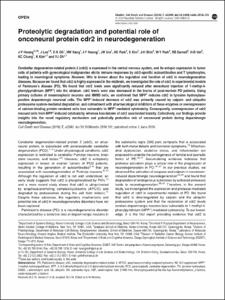Proteolytic degradation and potential role of onconeural protein cdr2 in neurodegeneration
- Title
- Proteolytic degradation and potential role of onconeural protein cdr2 in neurodegeneration
- Author(s)
- Hwang, J-Y ; Lee, J. ; Oh, C-K ; Kang, H. W. ; Hwang, I-Y ; Um, J. W. ; Park, H. C. ; Kim, S. ; Shin, J-H ; Park, W-Y ; Darnell, R. B. ; Um, H-D ; Chung, K. C. ; Kim, K. ; Oh, Y. J.
- Issued Date
- 2016-06
- Citation
- Cell Death and Disease, v.7, no.6
- Type
- Article
- Keywords
- 1 Methyl 4 Phenylpyridinium ; Adult ; Animal Cell ; Animal Tissue ; Article ; Autopsy ; Benzyloxycarbonylleucylleucylleucinal ; Brain Protein ; Calcium Binding Protein ; Calpain ; CALPAIN ACTIVATION ; Calpeptin ; CELL-DEATH ; Cerebellar Degeneration Related Protein 2 ; Controlled Study ; Corpus Striatum ; Cytotoxicity ; Degenerative Disease ; Dopaminergic Nerve Cell ; Experimental Parkinsonism ; Female ; Gene Overexpression ; Human ; Human Tissue ; MESENCEPHALIC DOPAMINERGIC-NEURONS ; Mesencephalon ; Messenger RNA ; Nerve Cell Culture ; NERVOUS-system ; NEUROLOGICAL DEGENERATIONS ; Neuropathology ; Nonhuman ; Oncoprotein ; OXIDATIVE STRESS ; PARANEOPLASTIC CEREBELLAR DEGENERATION ; PARKINSONS-DISEASE ; Primary Cell Culture ; Priority Journal ; Proteasome ; Protein Degradation ; Protein Expression ; Protein Function ; Rat ; Signal Transduction ; SPINAL-CORD-INJURY ; Transcription Factor ; Tyrosine 3 Monooxygenase ; Ubiquitin ; Unclassified Drug
- ISSN
- 2041-4889
- Abstract
- Cerebellar degeneration-related protein 2 (cdr2) is expressed in the central nervous system, and its ectopic expression in tumor cells of patients with gynecological malignancies elicits immune responses by cdr2-specific autoantibodies and T lymphocytes, leading to neurological symptoms. However, little is known about the regulation and function of cdr2 in neurodegenerative diseases. Because we found that cdr2 is highly expressed in the midbrain, we investigated the role of cdr2 in experimental models of Parkinson's disease (PD). We found that cdr2 levels were significantly reduced after stereotaxic injection of 1-methyl-4-phenylpyridinium (MPP+) into the striatum. cdr2 levels were also decreased in the brains of post-mortem PD patients. Using primary cultures of mesencephalic neurons and MN9D cells, we confirmed that MPP + reduces cdr2 in tyrosine hydroxylase-positive dopaminergic neuronal cells. The MPP+-induced decrease of cdr2 was primarily caused by calpain-and ubiquitin proteasome system-mediated degradation, and cotreatment with pharmacological inhibitors of these enzymes or overexpression of calcium-binding protein rendered cells less vulnerable to MPP+-mediated cytotoxicity. Consequently, overexpression of cdr2 rescued cells from MPP+-induced cytotoxicity, whereas knockdown of cdr2 accelerated toxicity. Collectively, our findings provide insights into the novel regulatory mechanism and potentially protective role of onconeural protein during dopaminergic neurodegeneration. © 2016 Macmillan Publishers Limited All rights reserved.
- Publisher
- Nature Publishing Group
- Files in This Item:
-
 기타 데이터 / 3.05 MB / Adobe PDF
download
기타 데이터 / 3.05 MB / Adobe PDF
download
- Appears in Collections:
- ETC 1. Journal Articles



